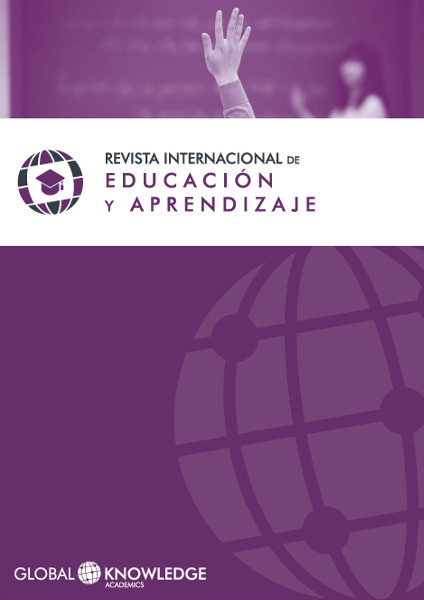Digital knowledges in public universities in the northwest of Mexico
DOI:
https://doi.org/10.37467/gka-revedu.v5.1492Keywords:
Digital knowledges, Students, UniversityAbstract
We conducted a research with mixed methods in which the main means for data collection were an online survey and a set of semi structured interviews with students of two public universities in Sonora, a northwest Mexican state that has a border with the United States of America. The population of the study counted with 556 students registered in different bachelors programs in three disciplinary fields. The digital knowledges of the participants were explored under two main lenses: gender and the disciplinary field. The main findings show that women have higher levels of technology appropriation than men, the discipline does not make a relevant difference and, on the whole, the levels of technology appropriation of the university students is lower than expected.
Downloads
Global Statistics ℹ️
|
973
Views
|
512
Downloads
|
|
1485
Total
|
|
References
Cabero, J. (2005). Las TIC y las universidades: Retos, posibilidades y preocupaciones. Revista de la educación superior. Vol. 34, Num. 135, pp. 77-100
Casillas, M.a, y Ramírez Martinell, A (coordinadores) (2016). Háblame de TIC Volumen 3: Educación Virtual y Recursos Educativos. Argentina: Brujas
Cobo, C. (2008). Aprendizaje adaptable y apropiación tecnológica: Reflexiones prospectivas. México: FLACSO México.
Crovi, D. (2007). Dimensión social del acceso, uso y apropiación de las TIC. Contratexto. Num. 16 pp. 65-79 DOI: https://doi.org/10.26439/contratexto2008.n016.784
Crovi, D. (coordinadora). (2013). Jóvenes y apropiación tecnológica: La vida como hipertexto. México: UNAM
Instituto Nacional de Estadística y Geografía-INEGI. (2013). “Disponibilidad y uso de tecnología de información y comunicaciones en los hogares”. Disponible en http://www3.inegi.org.mx/sistemas/microdatos/encuestas.aspx?c=34519&s=est
Nuñez, A., Cabrera, E., Ledezma, A., Moreno, H., Valdés, J. y Lugo, A. (2013). Apropiación social de las TIC y políticas educativas en la educación superior tecnológica. Pistas educativas. No. 101 pp. 6-16
Ramírez, A. (2012). Saberes Digitales Mínimos: Punto de partida para la incorporación de TIC en el currículum universitario. En Vargas, R. H. (coord.), Innovación Educativa, experiencias desde el ámbito del proyecto aula. México: FES
Ramírez, A., Morales, A. T. y Olguín, P. A. (2015). Marcos de referencia de Saberes Digitales. Edmetic: Revista de Educación Mediática y TIC, 4(2), 112-136. DOI: https://doi.org/10.21071/edmetic.v4i2.3965
Ramírez, A. y Casillas, M. A. (2015). Los saberes digitales de los universitarios. En J. Micheli. Educación virtual y universidad, un modelo de evolución. Pp. 77-106. Serie Estudios Biblioteca de Ciencias Sociales y Humanidades. México: Universidad Autónoma Metropolitana
Surman, M., Reilly, K. (2005). Apropiarse de Internet para el cambio social. Hacia un uso estratégico de las nuevas tecnologías por las organizaciones transnacionales de la sociedad civil, en Social Science Research Council (informe), disponible en http://biblioteca.hegoa.ehu.es/system/ebooks/15288/original/Cuaderno_de_trabajo_38.pdf, consultado el 15 de agosto de 2015.
Torres, S., Barona, C. (2012). Los profesores universitarios y las TIC. Uso, apropiación y experiencias. México: Ediciones mínimas.
Downloads
Published
How to Cite
Issue
Section
License
Those authors who publish in this journal accept the following terms:
-
Authors retain copyright.
-
Authors transfer to the journal the right of first publication. The journal also owns the publishing rights.
-
All published contents are governed by an Attribution-NoDerivatives 4.0 International License.
Access the informative version and legal text of the license. By virtue of this, third parties are allowed to use what is published as long as they mention the authorship of the work and the first publication in this journal. If you transform the material, you may not distribute the modified work. -
Authors may make other independent and additional contractual arrangements for non-exclusive distribution of the version of the article published in this journal (e.g., inclusion in an institutional repository or publication in a book) as long as they clearly indicate that the work was first published in this journal.
- Authors are allowed and recommended to publish their work on the Internet (for example on institutional and personal websites), following the publication of, and referencing the journal, as this could lead to constructive exchanges and a more extensive and quick circulation of published works (see The Effect of Open Access).













